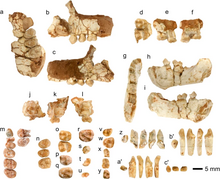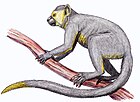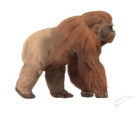Pliobates
| Pliobates Temporal range: | |
|---|---|

| |
| Pliobates fossils and reconstruction | |
| Scientific classification | |
| Domain: | Eukaryota |
| Kingdom: | Animalia |
| Phylum: | Chordata |
| Class: | Mammalia |
| Order: | Primates |
| Suborder: | Haplorhini |
| Infraorder: | Simiiformes |
| Family: | †Pliopithecidae |
| Subfamily: | †Crouzeliinae |
| Genus: | †Pliobates Alba et al. 2015[1] |
| Species: | †P. cataloniae |
| Binomial name | |
| †Pliobates cataloniae Alba et al. 2015[1] | |

Pliobates cataloniae is a primate from 11.6 million years ago, during the Iberian Miocene.[1][2][3] Originally described as a species of stem-ape that was found to be the sister taxon to gibbons and great apes like humans,[1] it was subsequently reinterpreted as a non-ape catarrhine belonging to the group Crouzeliidae within the superfamily Pliopithecoidea on the basis of discovery of new dental remains with crouzeliid synapomorphies.[4]
Mosaic characteristics
Its anatomy is gibbon-like; prior to this discovery, it was assumed that the ancestral ape bauplan was robust like Proconsul.[5] This species has mosaic characteristics of primitive, monkey-like features and the more derived ape characteristics; however, even when originally described it wasn't interpreted as a direct ancestor of modern apes but rather a side-branch that retained the ancestral morphotype and was thus placed in its own family Pliobatidae.[6] Its subsequent placement within Pliopithecoidea indicates that it was convergent with apes in elbow and wrist morphology.[4]
References
- ^ a b c d Alba, David M.; Almécija, Sergio; DeMiguel, Daniel; Fortuny, Josep; de los Rios, Miriam Pérez; Pina, Marta; Robles, Josep M.; Moyà-Solà, Salvador (30 October 2015). "Miocene small-bodied ape from Eurasia sheds light on hominoid evolution". Science. 350 (6260): aab2625. Bibcode:2015Sci...350.2625A. doi:10.1126/science.aab2625. PMID 26516285.
- ^ Bouchet, Florian; Urciuoli, Alessandro; Beaudet, Amélie; Pina, Marta; Moyà-Solà, Salvador; Alba, David M. (2021-12-01). "Comparative anatomy of the carotid canal in the Miocene small-bodied catarrhine Pliobates cataloniae". Journal of Human Evolution. 161: 103073. Bibcode:2021JHumE.16103073B. doi:10.1016/j.jhevol.2021.103073. hdl:2263/82958. ISSN 0047-2484. PMID 34628300.
- ^ Urciuoli, Alessandro; Zanolli, Clément; Bouchet, Florian; Almécija, Sergio; Moyà-Solà, Salvador; Alba, David M (2022). "Semicircular canal morphology of the Miocene small-bodied catarrhine Pliobates cataloniae: Phylogenetic implications". American Journal of Biological Anthropology. 77: 187. doi:10.13140/RG.2.2.34937.34409.
- ^ a b Bouchet, Florian; Zanolli, Clément; Urciuoli, Alessandro; Almécija, Sergio; Fortuny, Josep; Robles, Josep M.; Beaudet, Amélie; Moyà-Solà, Salvador; Alba, David M. (2024). "The Miocene primate Pliobates is a pliopithecoid". Nature Communications. 15 (1). 2822. Bibcode:2024NatCo..15.2822B. doi:10.1038/s41467-024-47034-9. PMC 10984959. PMID 38561329.
- ^ Barras, Colin (29 October 2015). "Fossil discovery could be the last common ancestor to all apes". New Scientist.
- ^ Kahn, Amina (29 October 2015). "Ancestor of all apes might not be what scientists expected, new fossil shows". Science Now. Los Angeles Times.




